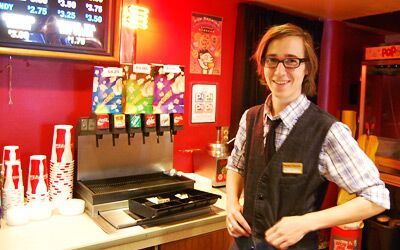Rough year for the silver screen? Not so, say independent theaters
 Photo/Rebecca Goldfine
Nickelodeon Assistant Manager Eric Richardson says the Old Port theater had a strong year in 2011, despite a national drop in movie ticket sales
Photo/Rebecca Goldfine
Nickelodeon Assistant Manager Eric Richardson says the Old Port theater had a strong year in 2011, despite a national drop in movie ticket sales
Could going out to the movies be going out of style? It doesn't seem possible. Yet the New York Times published an article last week reporting that 2011 ticket sales at movie theaters in North America fell $500 million behind 2010 sales. Hollywood.com, which publishes box-office data, projects this year's ticket revenue at $10.1 billion, a 4.5% drop from 2010.
But according to smaller, independent theaters in Portland and Brunswick, last year wasn't that bad as far as ticket sales and audience levels go. And their experience reflects a national trend showing a healthy number of viewers preferring foreign, independent or art films these days over splashy Hollywood films.
"This cinema is definitely doing well," Eric Richardson said recently as he handed out movie ticket stubs to customers filing in to the Nickelodeon in downtown Portland for a matinee. Richardson is the assistant manager for Nickelodeon, which is one of six theaters owned by Patriot Cinemas, a small chain based in Massachusetts. Richardson chalked up the Nickelodeon's continuing appeal and its steady profitability to its being the only multiplex in Portland, and for offering more artistic or niche films that aren't shown at bigger theaters. "Regal, Cinemagic," he says, naming nearby chain theaters in South Portland, Falmouth and Westbrook, "they're about kids and action."
Barry Norman, owner of the Eveningstar Theater in Brunswick, echoes Richardson, saying his theater operates in a niche outside the Hollywood blockbuster scene and in some ways is sheltered from the pressures affecting big chain theaters. "My demographic is older," he says, the baby boomer set rather than teenagers. "And my personal feeling is they're not as swayed by new media. Are they streaming films on their phones? Probably not. And they like the communal experience of going to the theater."
The Times quotes studio executives explaining last year's sorry performance by pointing to financially challenged young people (the industry's most loyal customers) spending their few dollars on other entertainment like video games, as well as to an overabundance of many family movies and the diminishing pull of celebrity actors. Souped-up home entertainment systems with surround sound, flat-screen TVs, vibrating chairs and Netflix DVDs, are also eroding movie-theater attendance.
Film critic Roger Ebert weighs in by blaming high ticket prices and "lack of choice" for dropping movie ticket sales. He writes on his site, "…all the shopping center compounds seem to be showing the same few overhyped disappointments. Those films open with big ad campaigns, play a couple of weeks and disappear."
Netflix data shows many rural residents choosing more obscure, independent and foreign films, according to Agata Kaczanowska, an entertainment industry analyst with market research firm IBISWorld Inc.
Norman credits just a few big hits for carrying his one-screen, 100-seat theater to profitability in 2011. This year those movies were "The King's Speech" and Woody Allen's "Midnight in Paris." "I am very confident if the kind of films I show, art-house and specialty films, are strong enough, they will come," he says.
Other movie venues in Portland had a decent showing last year. The Movies at the Museum sold more than 6,500 tickets in 2011, according to Kristen Levesque, Portland Museum of Art's spokeswoman. "One of the things that is really crucial for us is it brings in different audiences who might not usually visit the museum," she says.
SPACE Gallery, a nonprofit arts venue that screens documentaries and a few feature films, last year grossed $15,131 from movie ticket sales, about 13% of its total ticket sales for all shows, according to Executive Director Nat May. (Music shows draw the biggest crowds.) "We find that people still like to come here and watch movies in a group, or on a bigger screen with a nice sound system, or with a Q&A or presentation afterwards."
Phil Contrino, editor of BoxOffice.com, says art-house theaters are cyclical because their revenues are dependent on the content they can offer. But he's confident that in the long run, they'll still pull audiences who want a big-screen, communal experience, especially if they're smart about marketing.
For art-house theaters to survive into the future, Contrino says they need to actively market to younger moviegoers, including children. "You can't just be comfortable with the fact that baby boomers are keeping you afloat now," he says. "You have to look at the future, and get teenagers or 20-somethings interested now in the art-house experience, and that requires promoting yourself to them, on Facebook, on Twitter."
Norman of the Eveningstar is optimistic about 2012 because he's lined up movies for the next few weeks that he expects will be crowd pleasers, including "The Iron Lady," which he says has an unbeatable combination -- in particular for his baby-boomer viewers. "A historical drama with Meryl Streep? That will do well," he says.









Comments